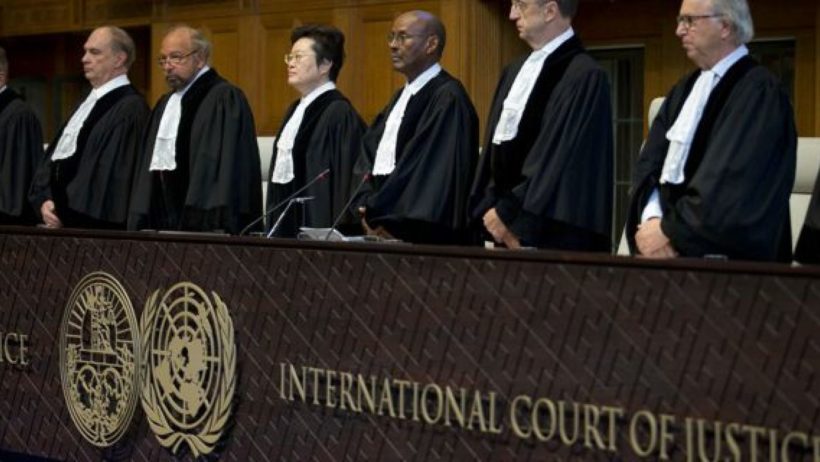UN’s world court orders US to ease Iran sanctions

The United States withdrew from the 1955 Treaty of Amity which normalized relations with Iran, Secretary of State Mike Pompeo announced Wednesday.
The move came after the UN’s International Court of Justice (ICJ), also known as the World Court, ordered Washington to ease sanctions on Iran so that humanitarian goods can enter the country again.
“I’m announcing that the United States is terminating the 1955 Treaty of Amity with Iran,” Pompeo said during a briefing announcing the termination of the agreement. “This is a decision frankly that is 39 years overdue.” [The Treaty was a pre-Iranian Revolution accord that regulated and promoted economic and consular ties between the two countries.]
[Following a complaint brought to the Court by Iran], the Netherlands-based court ruled that necessary medicines, medical supplies, food and agricultural products should be allowed into Iran. Earlier this year, the United States imposed sanctions to compel Iran to agree to a new nuclear deal. [President Trump had withdrawn from the controversial Iran nuclear deal President Obama made in 2015 without congressional approval, bypassing Congress by calling it an executive action instead of a treaty.] .
“The court considers that the United States must remove, by means of its choosing, any impediment … to the free exportation to the territory of Iran of goods required for humanitarian aid,” said ICJ justice Abdulqawi Yusuf.
This sets up another showdown between the ICJ and the U.S. administration, which has already said the court has no jurisdiction over its foreign policy, especially concerning national security. The court is the primary judicial arm of the United Nations. [Pompeo said that the U.S. is “disappointed the court failed to recognize it has no jurisdiction.”]
Wednesday’s decision marks the first time the ICJ, also known as the World Court, has intervened on sanctions against another country.
The court said in its 29-page ruling the U.S. sanctions violate the Treaty of Amity, which was established a quarter-century before Iran’s Islamic revolution in 1979.
“The decision proved once again that the Islamic Republic is right and the U.S. sanctions against people and citizens of our country are illegal and cruel,” Iran’s foreign ministry answered in a statement.
In his speech before the United Nations General Assembly last week, President Donald Trump called on all countries to isolate Iran and stop the flow of money to the regime of President Hassan Rouhani.
The sanctions have caused Iran’s economy and currency to decline sharply, and a new round of penalties to limit oil exports take effect in November. Countries will be prohibited from buying Iranian crude oil exports.
The court’s decision is binding, but it has no power to enforce it. The United States left the International Court of Justice more than a decade ago.
Article Source : https://www.studentnewsdaily.com/daily-news-article/uns-world-court-orders-us-to-ease-iran-sanctions/
ImageSource :
VOCABULARY WORDS
1. normalize /verb : to establish or resume (relations) in a normal manner, as between countries.
2. sanction /noun : authoritative permission or approval, as for an action.
3. humanitarian /noun : having concern for or helping to improve the welfare and happiness of
people.
4. overdue /adjective : past due, as a delayed train or a bill not paid by the assigned date; late:
5. consular /noun : an official appointed by the government of one country to look after its
commercial interests and thewelfare of its citizens in another country.
6. impose /verb : to lay on or set as something to be borne, endured, obeyed, fulfilled, paid, etc.:
7. controversy /noun : a prolonged public dispute, debate, or contention; disputation concerning a
matter of opinion.
8. impediment /noun : obstruction; hindrance; obstacle.
9. isolate /verb : to set or place apart; detach or separate so as to be alone.
Questions
1. The first paragraph of a news article should answer the questions who, what, where and when. List the who, what, where and when of this news item. (NOTE: The remainder of a news article provides details on the why and/or how.)
2. Why did Secretary Pompeo withdraw the U.S. from the treaty with Iran? What did he note about the decision?
3. Why did the U.S. impose new sanctions on Iran this year? (What is the goal of the sanctions?)
4. a) What is the ICJ?
b) What has the Trump administration said/done about ICJ jurisdiction over the U.S.?
5. What is unusual about Wednesday’s ICJ decision regarding the U.S.?
6. a) During his address to the UN General Assembly last week, what did President Trump call on member countries to do regarding Iran?
b) Read the “Background” below the questions. Why does the U.S. (and many other countries in the region) want Iran to end its pursuit of nuclear weapons?
7. a) What effect have U.S.-led sanctions against Iran had so far?
b) Ask a parent: Do you think U.S.-led sanctions will be effective in pushing Iran to end its quest for nuclear weapons? Please explain your answer.
8. In his speech to the UN, President Trump emphasized the belief in national sovereignty over globalism. He said, “Sovereign and independent nations are the only vehicle where freedom has ever survived, democracy has ever endured, or peace has ever prospered. And so we must protect our sovereignty and our cherished independence above all.” He also said, “America is governed by Americans. We reject the ideology of globalism…”
a) Do you agree with these principles? Explain your answer.
b) Watch Secretary Pompeo’s remarks in the video under “Resources” below. What do you think about U.S. response to the ICJ attempting to tell our government what actions we are allowed to take in regards to our foreign policy? (Agree, disagree?) Explain your answer.